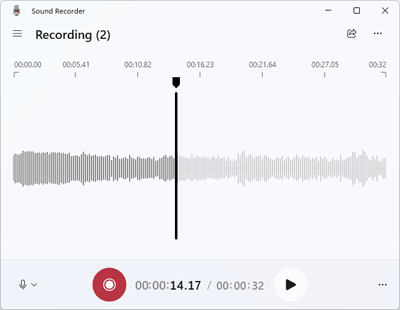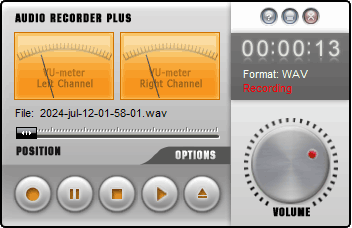
When it comes to digital audio, WAV is a great option for recording high-quality audio. You know how it is, we all tend to use compressed files like MP3 or AAC for everyday listening because they are smaller, but WAV files, which contain uncompressed PCM audio, actually provide the best clarity and accuracy. They are especially good for use in applications where audio quality is more important, such as forensic analysis, podcast editing and transcription, voiceover transcription, and mastering.
While native and third-party Windows 11 apps have their advantages, most do not provide full WAV recording capabilities. In this article, we will look at three of the best, how they compare in terms of functionality, usability, and performance on modern hardware, and which you should use and why, depending on your requirements.
1 Why Record in WAV Format?
WAV has historically been utilized by professionals, not because of any inherent superiority, but because it preserves raw, unprocessed samples free of compression artifacts. This ensures that every single detail—fine background hiss to transient spikes—is preserved exactly as they were recorded.
While lossless compression codecs like FLAC or ALAC offer the same audio quality in a smaller envelope, recording to WAV directly is still useful in certain situations:
- When working with audio editing software, which often imports raw PCM data without requiring prior decoding.
- When preserving evidence or legal recordings, where even metadata and encoding history can impact admissibility.
- For users who need real-time monitoring and processing, since WAV files don’t require decompression before playback or editing.
Although these advantages exist, most contemporary recorders opt out of WAV in favor of compressed formats to conserve disk space and enhance mobility. But if audio quality matters and post-processing is a priority, having the appropriate WAV recorder for Windows 11 is the way to go.
2 Native Windows Recorder
The Voice Recorder app bundled with Windows 11 may be convenient, but it’s far from ideal for professional or advanced personal use. It defaults to saving files in M4A or MP3 format, and while it does support WAV under certain conditions, it lacks basic controls like input selection, gain adjustment, or voice activation.

It also doesn't include features like automatic splitting, noise suppression, or scheduled recordings, making it unsuitable for long sessions or archival purposes.
Despite Microsoft's efforts to modernize the app over the years, its interface and functionality remain minimal — more suitable for quick memos than for serious audio capture. If you’re looking for something beyond basic dictation, it’s best to look elsewhere.
3 Improved Alternative
One of the earliest dedicated WAV recorders still in use today is Audio Recorder Plus, a program that has been around for over two decades. It offers a straightforward interface and supports core features like voice-activated (VOX) recording, auto-stop, and gain control via classic VU meters.

For those used to traditional interface designs, Audio Recorder Plus is a refreshing flashback. It allows you to start and stop recordings based on sound detection, which is useful for interviews, lectures, and atmosphere recording.
However, the list of features it gives out is not quite enough for the user who has some really high expectations:
- There is no integrated file management system, so organizing recordings must be done manually.
- No native cutting or tagging functionality, so you will have to use third-party applications to cut or tag files.
- The software is not fully optimized for newer Windows versions, particularly Windows 10 and 11, with some scaling issues or compatibility issues at times.
However, for others needing an uncomplicated, streamlined piece of software that functions without requiring high-end systems, Audio Recorder Plus can serve as an acceptable alternative — especially for those needing uncomplicated WAV output without the compression overlay.
4 Maximum possibilities
If you are in need of a full-featured WAV recording application for Windows 11, i-Sound Recorder is the strongest option. It's the sole utility amongst the others that possesses both robust recording features as well as smart automation with real-time enhancement.

This recorder goes beyond basic capture by offering:
- Scheduled recording, allowing you to set up automatic capture of radio shows, podcasts, or online streams while away from your computer.
- Automatic gain control (AGC), ensuring consistent volume levels even in fluctuating environments.
- Voice activity detection (VOX), which starts and stops recordings based on sound — perfect for interviews or long-distance calls.
- Metadata tagging, including automatic artist recognition and album art download when recording from streaming services.
- Built-in audio editor, letting you trim, normalize, and enhance recordings within the same environment.
What sets i-Sound apart from others is its ability to manage recordings intelligently. It doesn't just record — it organizes, labels, and enhances your files as they're being created. You can store recordings in custom folders, apply tags during capture, and even split long sessions into smaller segments automatically.
The only notable drawback is that i-Sound Recorder is a paid application, though its advanced feature set justifies the investment for regular users. Additionally, while recordings are stored in standard directories rather than a database, the included file manager makes navigation and retrieval surprisingly smooth.
5 Conclusion
While WAV recording may seem outdated to some, it remains an important choice for professionals, educators, and content creators who demand clean, unaltered audio for editing, archiving, or forensic use.
From the basic but accessible Voice Recorder in Windows 11, to the classic yet limited Audio Recorder Plus, and finally to the feature-rich i-Sound Recorder, each option serves a different user profile.
Ultimately, the right WAV recorder depends on what you plan to do with your audio:
- For quick notes and casual use, stick with the native app — it's free and always available.
- For simple VOX-based capture, try Audio Recorder Plus — just be prepared to handle post-processing externally.
- For complete control, automation, and professional results, i-Sound Recorder is the clear winner.
So next time you're ready to make a high-quality WAV recording on Windows 11, don’t settle for less — choose the right tool and capture every detail with confidence.
